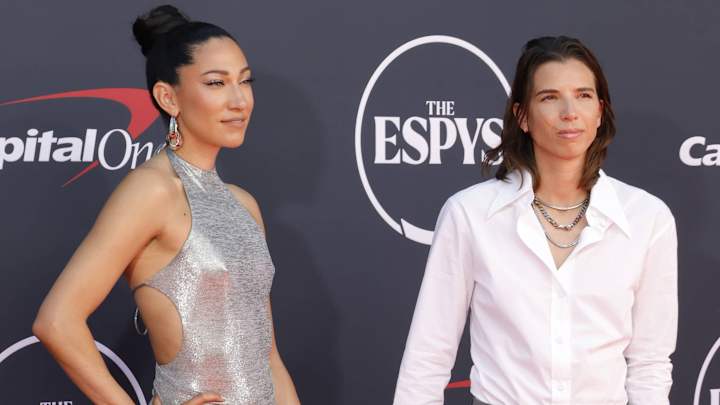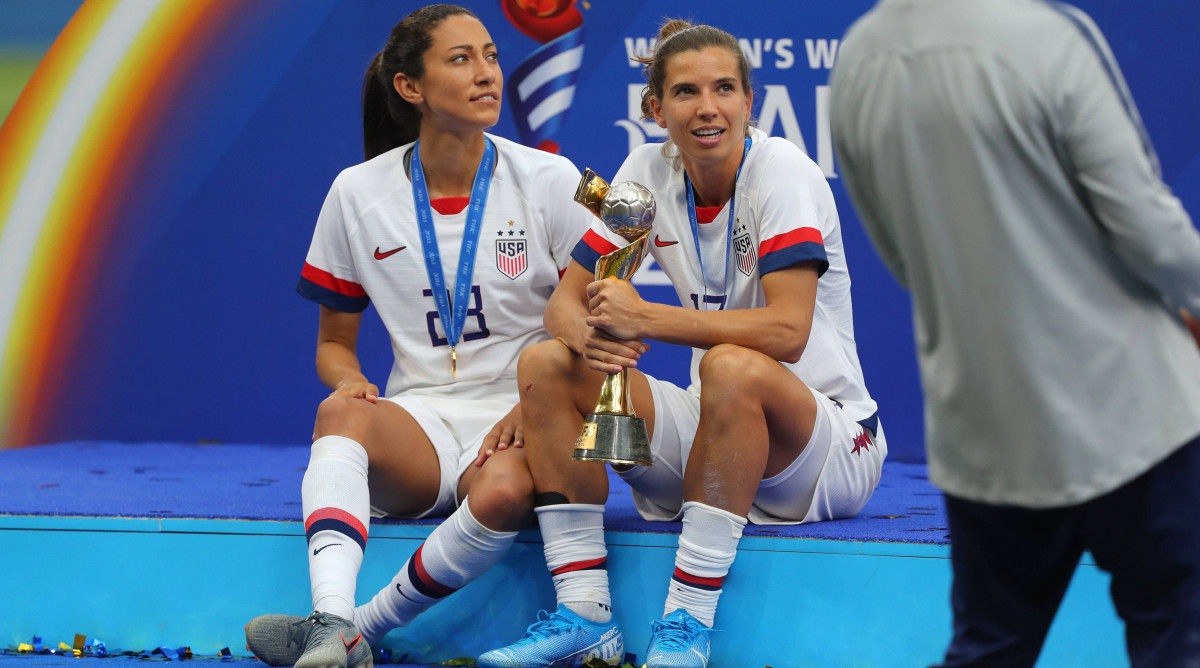Christen Press and Tobin Heath Are Breaking Through the Noise Amid World Cup Chaos

This Women’s World Cup is decidedly not the tournament of World Cups past. For one, the U.S. is out, with the two-time reigning champions bounced in the round of 16, making way for a new winner after eight years in possession of the trophy. More specifically, it also marks the first World Cup since 2011 without USWNT star Tobin Heath and the first sans frontline pillar Christen Press since ’15. The USWNT mainstays are both sidelined with injury, having missed the trip Down Under, and what would’ve been their fourth and third World Cups, respectively.
Instead, the duo have taken to the airways, launching the The RE-CAP Show: World Cup Edition, an outgrowth of their RE-INC brand, which Heath and Press cofounded alongside fellow USWNT stars Megan Rapinoe and Meghan Klingenberg in 2019. The new series has quickly emerged as one of the most nuanced, contemplative and compelling commentaries of this World Cup, breaking through the noise that the event can often dust up, with earned candor.

The episode following the USWNT’s crushing loss to Sweden is, expectedly, the most candid and affecting installment to date, with Heath and Press at times incredulous, other times teary-eyed and often impassioned. “It may seem like we lost this game by a millimeter,” Heath said to Press, referencing the U.S’s dramatic PK defeat. “But we lost this tournament by a mile.”
A couple of days after the loss, Heath expanded on the comments she made on the show, drilling down on what exactly led to the USWNT’s shocking exit.
“There is winning, and then there is creating systems of winning and this is where the USWNT has always found its strength, in creating winning systems. In order for a system to work it has to operate in a particular way,” Heath tells Sports Illustrated. “These are decisions upon decisions upon decisions, methodologies, things that you know work, things that you know are required in our particular national team.
“From my experience on the USWNT, and I’ve been a part of that system since I was a little kid, the winning system, to me, was unidentifiable in the process leading up to that World Cup.”
If the criticism Heath and Press offer up feels unique—especially compared to what else is in the space—that is by design, with Heath and Press eager to provide their perspective as former players and standard bearers for women’s sports culture.
“There is a void, and I think we knew that just through our experience dedicating our lives to women’s sports, that media did not represent us,” says Heath, “and the media that was around us pretty much our whole entire career didn’t represent us.”
The pair aren’t interested in simply adding to the existing media environment (one they say is created around and outfitted for men’s sports), they are hoping to redefine it with a term they have coined “Gal Culture.”
What is Gal Culture?
“It was inspired by the badassery of the U.S. women’s national team,” says Heath, “but it’s representing all of what women’s sports culture is, and that’s not just about women and that’s not just about sports. We use the lens and the narrative of sports to really talk about issues that are actually what women’s sports is, which is around women’s health, queer culture, equal pay, racial equality.”
This World Cup has stirred up a lot of conversation in women’s sports, like how the game is talked about and reported on, and more pointedly who does and doesn’t root for the USWNT and why (sometimes in a thinly veiled act of virtue signaling). Amid the commotion, Heath and Press are providing a space, and producing content, that feels more authentic to loyal women’s sports fandom and support, which is decidedly queer—in all senses of the word—in nature.
“The community that we’ve cultivated … it is very strong and secure in its values,” says Press. “I feel like every element of my life brings me back to a group of people, a community, that is very purpose-led, that is passionate about the things that we are doing because they believe in a reimagined future that is more diverse, more inclusive, more positive, more caring.”
With a platform and a microphone, Heath and Press are righting a longstanding wrong. After years of feeling “othered,” “left out” and like the “back house of an established sports infrastructure that was designed for men,” now they get to tell their own story—and provide a place for others to do the same.
The limelight, however, hasn’t always been something Heath or Press have gravitated toward. In their decades as professional athletes, neither have been known for their gregariousness in the press. That hasn’t quieted the whirlwind of fandom that swirls around the pair though, with Heath and Press prominently featured in some of the most fervent corners of women’s soccer internet. The RE-CAP Show has given steadfast supporters a highly anticipated and much-appreciated look into the personalities of two of the most popular, and private, figures in the sport. Much to the delight of their followers, Heath set social media ablaze singing, “Where have all the gay girls gone,” while Press has showcased her comedic timing on the show, a skill she says she didn’t know she had.
While the series certainly works as inadvertent fan service, where it really thrives is its impressive roster of guests. The first few episodes featured former USWNT coach Jill Ellis, Dutch star Vivianne Miedema, OL Reign coach Laura Harvey, former USWNT defender Abby Dahlkemper and even Sweden’s Kosovare Asllani, fresh off her team’s win over the U.S. Their Rolodex is an enviable who’s-who of women’s soccer, setting it apart from traditional media.
“There is no part of this planet that we can’t touch with a text or a phone call,” says Heath, referencing her and Press’s time playing for various clubs abroad. “We put a lot of equity into those relationships because that is what Gal Culture is. … It’s actually a really beautiful thing to see so many people want to support us and be a part of this.”
Do those relationships ever get complicated, especially given how unflinching Heath and Press have been in their critique of the USWNT? After all, they aren’t that far removed from the team, with Press even making a run at this World Cup before a setback with her ACL injury rehab. The answer for them, and seemingly their teammates, is emphatically no.

“Can you be critical and come at a place of respect and love at the same time? Absolutely,” says Heath. “When I watch the USWNT games, there is probably no one more critical than me, but it's because I have been there and that’s exactly how I would watch it while I was watching it next to one of my teammates, saying, ‘What were we doing here? What were we doing on this play?’”
Heath and Press are outspoken because they care, both dedicating much of their lives to the sport and to USWNT—a connection that is evident and deeply felt. Given that, the two have ideas about how they’d like to see the team and the sport move forward. The postmortems have streamed in following the USWNT’s disappointing World Cup campaign. Has the world caught up? Is there an issue in youth soccer? Is the USWNT’s culture to blame?
It's a little bit of everything, per the two, but Press focuses her attention on the systemic failure of the pay-to-play system. “It is completely dependent on a financial situation of the youth player,” says Press. “I want us to be able to create an environment where football is truly for everyone and it’s inclusive and I think that it's really important for society and our culture and our whole country, and I also think it will lead to a better player pool and better teams.”
While the discussion around the U.S. will surely continue (and rightfully so), for now Heath and Press are forging ahead with their World Cup show. With the USWNT out, the series had to pivot, but it has also presented them the opportunity to highlight emerging and established talent across the tournament, many of whom they’ve played with at the club level. Their goal in starting the series was to shine a spotlight on women’s sports, and that’s precisely what they plan to do for the remainder of the World Cup—and likely beyond.
“When I think of women’s sports, everybody wants to try to put it in its corner, fragment it, make it niche,” says Heath, “but women’s sports is the future.”
